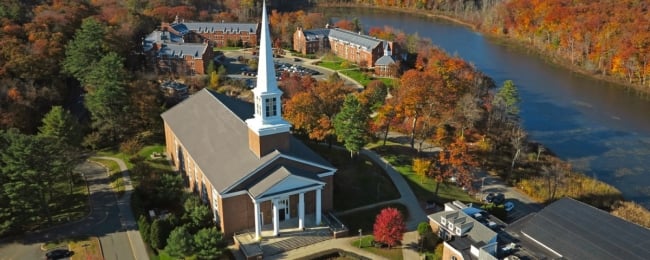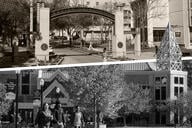You have /5 articles left.
Sign up for a free account or log in.

Gordon College
Gordon College, an evangelical Christian college outside Boston, announced that it will eliminate 36 faculty and staff positions and consolidate and cut a number of majors in a budget-cutting move. Among the changes, Gordon is eliminating stand-alone majors in chemistry; French; physics; middle school and secondary education; recreation, sport and wellness; Spanish; and social work, and it is merging political science, history and philosophy into a single department.
In detailing the changes, Gordon said it is creating new multidisciplinary or “integrated” majors: for example, in lieu of a chemistry major, future Gordon students can enroll in a new biochemistry and integrated science major. Students interested in physics can take a physics track within a new physics and applied science major. A new sociology and social practice major will combine sociology and social work. Within the combined history, philosophy and political science department, stand-alone majors in political science and international relations will continue to be offered, and potential dual majors such as history and philosophy and history and political science are under review.
Rick Sweeney, Gordon’s vice president for external relations, said Gordon is cutting 7 percent of its operating budget over the next two years. Eleven faculty members are being laid off and two more retiring faculty will not be replaced. In addition, six staff members are being laid off and an additional 17 vacant staff positions will not be filled.
In information posted on its website about the changes, Gordon said it wants to make its education more “affordable and adaptable” and encourage completion of undergraduate programs within three years. Gordon is also expanding its graduate and online offerings through a newly created School for Graduate, Professional and Extended Studies, and said that a $10 million gift announced on Friday would be used for this purpose.
“We are at an inflection point in the history of Gordon and both fortunate and grateful we are being proactive now rather than reactive farther down the road,” Gordon’s president, Michael Lindsay, said in prepared remarks shared with Inside Higher Ed.
“Not all schools our size are able to pursue new opportunities while balancing their budgets,” Lindsay said. “The gift received on our April day of giving was not only totally unexpected, but to our knowledge the largest single monetary donation made to Gordon at any one time. This gift of $10 million, restricted to the endowment, is able to provide funds immediately that will support our necessary investment in creating Gordon Global, our planned digital platform within the newly created School of Graduate, Professional and Extended Studies. These funds will assist the college in getting this new initiative off the ground with the first phase to be launched in 2020. Clearly this anonymous donor is someone willing to come alongside us as we strengthen our core liberal arts education as we develop new points of access and opportunities that will make Gordon more affordable and more adaptable in meeting the needs of current and future students and families.”
Many Christian colleges are known for their strong commitment to the liberal arts, and some lamented the cuts to traditional liberal arts majors at Gordon in favor of an expansion of professional programming.
John Fea, a professor of history at Messiah College and author of, among other books, Why Study History? (Baker Publishing Group, 2013) wrote on his blog that he was saddened by the loss of a stand-alone history major at Gordon. “The skills and ways of thinking that one learns from the study of history are not something that can happen in a few courses as part of an 'integrated major' like politics-philosophy-history,” Fea wrote. “In over two decades of teaching at Christian liberal arts institutions, I can attest to the fact that a historical way of seeing the world -- one informed by contextual thinking, the understanding of contingency, the complexity of the human experience, a grasp of causality and change over time -- is something that is cultivated through a deep dive into the discipline. You can’t come to an interdisciplinary or 'integrated' conversation without grounding in a discipline.”
In an interview Fea described Gordon as one of the "big five or six" institutions within Christian higher education. “Gordon College, I would say, historically has always been a flagship evangelical liberal arts college,” he said. “When a lot of other evangelical colleges have decided to move in a direction of more professional programs, continuing education, cash-cow graduate programs, Gordon and other schools like Wheaton College [in Illinois], for example, have always been seen as defenders of the liberal arts and have always celebrated that. Of all places for Gordon to start making these cuts to the humanities and liberal arts, it speaks volumes and [sends] shock waves, I would say, throughout the Christian college world.”
Inside Higher Ed reached out Wednesday to eight different Gordon faculty members, none of whom agreed to comment on the changes; one said that requests for interviews with faculty had to be approved by Gordon’s external relations office. The student newspaper, The Tartan, reported on a meeting with more than 100 students on Saturday about the changes. The paper said the tone of student questions at the meeting “suggested a clear frustration; students wonder how they will be able to finish their soon-to-be defunct or 'integrated' courses of study in light of significantly reduced faculty.”
On the college's Facebook page, some commenters defended Gordon for making tough decisions, while others criticized it for laying off faculty or for, in their view, moving away from its liberal arts tradition. Commenters also criticized the timing of the announcement, coming as it did after the May 1 deadline for incoming freshmen to give colleges their decisions. Gordon said in a Facebook comment that the college’s budget for the coming year was not finalized until mid-May.
“It’s the Stevens Point story but with the evangelical twist -- to be more specific, Stevens Point with an evangelical higher education marketing twist,” said Adam Laats, a professor of education at the State University of New York at Binghamton and author of Fundamentalist U, a book about evangelical Christian education (Oxford University Press, 2018). Stevens Point is a reference to the University of Wisconsin Stevens Point’s controversial 2018 plan (since abandoned) to cut 13 liberal arts majors.
"Schools like Gordon -- and not just Gordon, small evangelical and nonevangelical institutions -- are in the same boat. They can’t raise tuition, but they can’t keep going without raising tuition because they don’t have the funding. They don’t have the big endowments. They can’t afford expensive lab equipment for every chemistry faculty person," Laats said. "Forget about evangelical: this is a [broader] higher ed story. Small colleges are struggling, and they are trying to find a niche."
At the same time, Laats said that the “evangelical twist” is Gordon’s own awkward position vis-à-vis LGBTQ rights issues and its market of evangelical Christian parents and students.
“Gordon has been sort of pushed into this awkward position,” Laats said. “It’s in Massachusetts, it’s near Boston, it has traditionally for the last 70 years been seen as one of these academically elite, religiously relatively liberal schools, so that you have things like LGBTQ students who say, 'I’m evangelical, but if I’m going to go to an evangelical school, Gordon is relatively friendly to LGBTQ students.' In the past few years, though, the newish president, Michael Lindsay, he hasn’t quite moved the school to the political right, but he has gestured that way by signing a statement to President Obama, for example, affirming the school's LGBTQ policies. He didn’t change the policies. He just officially affirmed what the school officially had agreed to, which is there’s no LGBTQ practice, you could only have sex in a heterosexual marriage -- that had been the policy forever, but he signed this letter and affirmed it, and that led to a huge row within the Gordon community.”
In short, Laats continued, “Gordon has struggled for years in terms of trying to find the sweet spot in terms of evangelical marketing, and it has signaled a move to the political right, which I think has put it in a tough spot. It’s not the tradition at Gordon. If you’re trying to move to the evangelical right, you can’t move too far to the right to out-right some of the schools that are out there. Gordon can't get conservative enough to be more conservative than Liberty [University] -- it’s not going to -- but it also can’t be seen as too liberal, because families will stop coming.”




